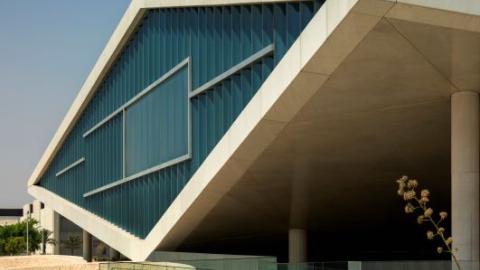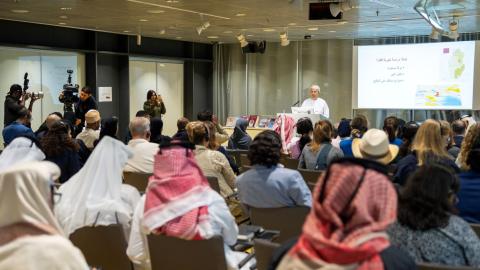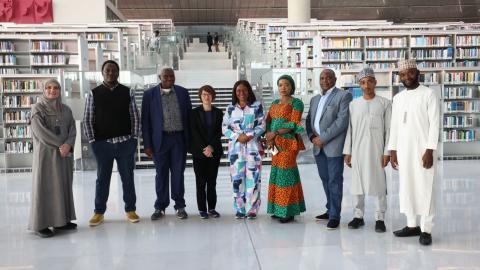
Qatar National Library has touched the lives of many in the first year since officially opening to the public on 16 April 2018. The Library is an expression of democratic value and openness, and the building and its services are an embodiment of such concept. The Library is entirely open and accessible, and places particular effort to ensure equal access to a trove of valuable resources for every member.
To create an accessible environment, the Library has tapped into mainstream and newer technological advances to extend a range of services and activities to people with disabilities. The Library’s main collection includes large-print books, audiobooks and books in braille for visually impaired readers, while a dedicated assistive technology space helps people with special needs access information and library materials, including ebooks, audiobooks, music and videos.
One reader who is benefitting from such support is Iman Hussein Rammal, a special education teacher in braille, information technology, and English at the Al Noor Institute for the Blind. She loves to read and is pursuing her interest in psychology. She’s also visually impaired, and finding accessible materials can be a challenge. So it’s no wonder she spends as much time as she can at Qatar National Library, where the dedicated assistive technology space lets her indulge herself personally and professionally.
Iman first visited the Library last year, shortly after it opened its doors to the public, for an event organized by the Qatar Social and Cultural Center for the Blind and Weill Cornell Medicine-Qatar. She was immediately impressed by the services it offers for people with functional limitations, such as screen readers installed on the computers and braille books in Arabic and English.
“When I discovered that the Library is accessible, I was overjoyed. It opens up tremendous possibilities for the visually impaired,” Iman recalls. “This makes those in the community with disabilities feel we are equal and independent. Before the opening of the Library, there was a huge gap, with no inclusive public place available to the visually impaired to engage in similar activities independently. Without a screen reader, I’d have to rely on others to read for me. Of course, we use audio books, but reading braille books makes you more independent.”
Braille is a tactile writing system for visually impaired people, and Iman is keen to help others learn the touch-based system so they can fully benefit from the Library’s adaptive services. She volunteers her time at the Library by offering workshops, training and other learning opportunities.
She often spends two to three hours on Saturdays in the assistive technologies section at the Library, which is equipped with a range of tools and software for visitors with disabilities, as well as free access to an online library called Bookshare. Bookshare has more than 500,000 braille and audiobooks in English and Arabic for visually impaired users or anyone who can’t read standard print.
“Having access to Bookshare is very helpful for me and my students. At university, I studied political science, public administration, English language and literature, and educational psychology, and I still love learning about all of them,” Iman says. “I enjoy the works of Shakespeare—my favorite is definitely Hamlet. Another title I recently enjoyed is Going to Baghdad. With so many categories available in braille through Bookshare, I can read literature and continue developing my interest in psychology or keep up to date with developments in my profession.”
She encourages her students and the community to visit the Library to educate themselves and, if they don’t know where to start, to ask one of the helpful librarians for assistance.
“The staff members at the Library are so helpful, and I work with Ellen Floro, Information Services Librarian for Adaptive Services and Second Language Learning, on our shared plans for the visually disabled,” she says. “We brought Ellen to speak at the Al Noor Institute and she encouraged the parents of our students, who are in primary level, to bring them to the Library to help them learn independently.”
The number of titles available to visually impaired users will continue to grow thanks to Qatar’s signing of the Marrakech Treaty, which allows for copyright exceptions to enable the creation of books and other copyrighted works for visually-impaired and print-disabled persons. The Library also hosts a monthly Book Club for the Blind, in which readers discuss a title of relevance to the visually impaired community.
“It’s very important for national institutions to be inclusive of people with disabilities and ensure equal access,” Iman says. “The Library is a very special place—we have our own space where we can read, go online and learn. It has made people with disabilities feel equal and independent, and at the same time active members of the community. That's a very important legacy.”







